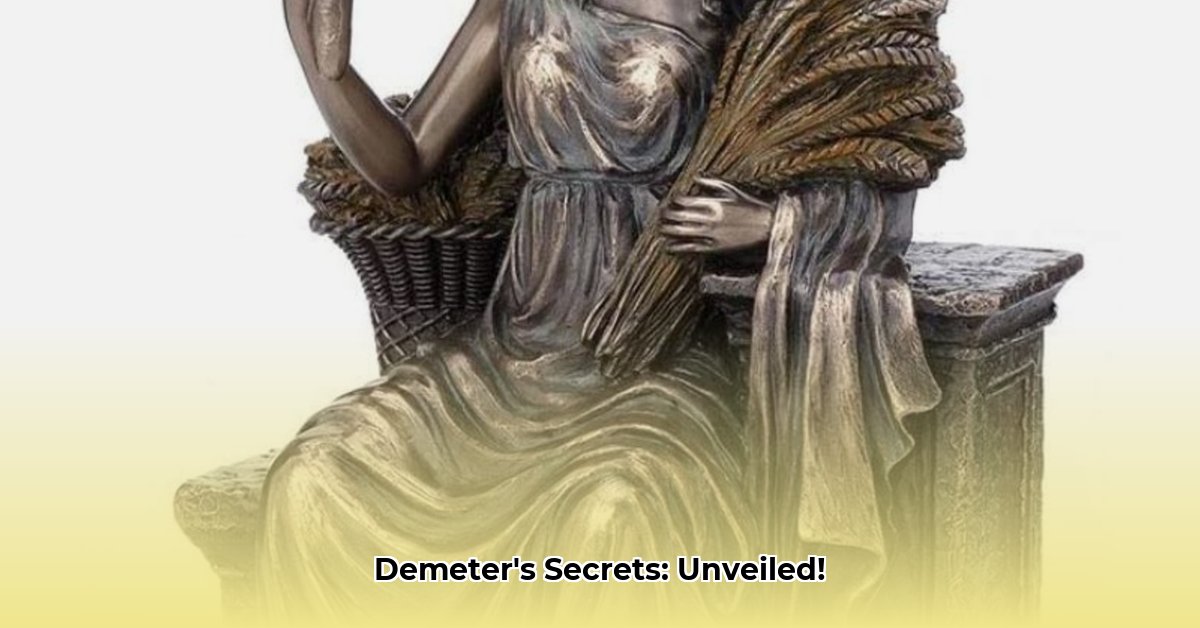
Demeter: Mother, Goddess, and the Mysteries of the Harvest
Eish, Demeter. The name itself conjures images of rich, fertile lands and bountiful harvests, doesn't it? But this Griekse Godin Van Landbouw (Greek Goddess of Agriculture) is more than just a symbol of a good crop; she’s a powerful force, a grieving mother, and a figure whose story resonates with humanity's deepest concerns. Her myths are a bit like a good braai – packed with flavour, but with some bits a little more charred than others. Did Hades really kidnap Persephone, or was it a bit more complicated? And just how much did Demeter's actions shape the seasons? We’re going to delve into the captivating tales, sorting through the inconsistencies and exploring what they reveal about ancient Greek beliefs. Think of it as a lekker cultural potjie – a mix of storytelling and academic insights.
Did you know that the stories about Demeter aren't always consistent? This raises a fascinating question: how much does the portrayal of Demeter differ based on who is telling the story? This variety gives us a richer understanding, not a flawed one.
Demeter and Persephone: A Mother's Grief, a Daughter's Descent
The core of Demeter's myth revolves around the abduction of her daughter, Persephone, by Hades, the lord of the Underworld. This wasn't just some random snatch-and-grab; it was a pivotal moment that sent shockwaves through the cosmos – and the seasons. Many versions exist; some portray a more forceful kidnapping, others hinting at a degree of Persephone's consent, or even a pre-arranged agreement between the gods. Professor Sarah Morris, Head of Classics at the University of Cape Town, points out, "The varied accounts highlight the fluidity of oral tradition and the multiplicity of interpretations that a myth could support". Demeter's response, a devastating display of heartbroken rage, brought the world to a standstill. The earth withered, crops failed, and famine threatened humankind, showcasing the profound connection between the goddess and the natural world. Zeus, her brother and king of the gods, eventually brokered a deal: Persephone would spend part of the year in the underworld, mirroring the cycle of seasons and the ebb and flow of life and death. It’s a powerful symbol of loss and renewal – a story that strikes a chord even today.
But wait, there's more! Certain versions even suggest that Demeter's sadness wasn't entirely about Persephone's abduction. Some myths allude to her own experiences with other gods...let's just say, the goddess wasn't always a picture of serene grace.
Contradictory Accounts: Unpacking the Mysteries
The narratives surrounding Demeter are far from uniform. Different sources offer different versions of events, sometimes dramatically so. Was Poseidon's encounter with Demeter a forceful violation or a consensual interaction? How many pomegranate seeds did Persephone actually eat in Hades' realm, a seemingly small detail with significant consequences for the time she spends in the Underworld? (These details influence the duration of winter, the length of time Persephone stays in the Underworld). These inconsistencies, far from diminishing the stories' power, highlight the challenges of reconstructing ancient narratives passed down through generations of oral tradition – what the ancient Greeks would have called logoi (stories). This lack of absolute accuracy only enhances the richness of the myths, reminding us that there’s always more than one side to the story. Dr. Thandiwe Mthembu, Professor of Religious Studies at Stellenbosch University, notes: "The variations themselves reflect the dynamic nature of mythology, where stories evolve and adapt to the beliefs and values of different communities and time periods."
How many seasons are there, technically? Are there only four? Or are there more?
Demeter's Enduring Legacy: From Ancient Rituals to Modern Interpretations
Despite the ambiguities, Demeter's influence is undeniable. Her cult at Eleusis, near Athens, thrived for centuries. The Eleusinian Mysteries, secret rites associated with her worship, promised spiritual renewal and deeper understanding of life and death, making her more than a mere goddess; she was central to religious life, agricultural practices, and social order. Her impact extends to modern society through art, literature and philosophical explorations of loss, renewal and the power of nature. Her story persists, prompting us to engage with the complexities of human experience.
Key Pivotal Points:
- The abduction of Persephone: A pivotal event that symbolised the cycle of seasons and the relationship between life and death.
- Demeter's wrath: Her response to Persephone's abduction demonstrates the goddess's immense power and the profound connection between the divine and the natural world.
- The Eleusinian Mysteries: These secret religious rites provided spiritual renewal and offer a glimpse into the depth and complexity of ancient Greek religious beliefs.
Demeter's Influence: Then and Now
| Aspect | Ancient Greece | Modern Interpretations |
|---|---|---|
| Religious Significance | Central figure in agricultural and fertility cults; source of spiritual renewal through Eleusinian Mysteries | Symbol of motherhood, cyclical nature of life, environmentalism |
| Cultural Impact | Shaped agricultural practices, social structures, and religious life | Inspires art, literature, and philosophical discussions on themes of loss, renewal, and the power of nature |
| Lasting Relevance | Archaeological findings continue to contribute to our understanding of her cult | Offers insights into the human experience and the enduring power of myths |
How to Interpret Conflicting Accounts of Demeter's Myths
Understanding Demeter requires a nuanced approach. We must consider the source material, the narrative's focus, its intended audience, and the literary genre. By acknowledging the different perspectives, we appreciate the richness of the myths. The contradictions aren't flaws, but rather reflections of the evolving interpretations of Demeter across different times and cultures, demonstrating the lasting impact of powerful storytelling.
Remember, every myth can be a journey, a new way of looking at the world, and the world has different perspectives to offer.